By Lorna Benson
November 19, 1997
|
|
RealAudio 2.0 14.4 |

click on all photos for a larger view
National Geographic photographer and writer William Allard likes to spend his free time at the lake. It's sort of a family tradition for Allard who spent many childhood summers frolicking in Lake Gladstone in north central Minnesota. In his new book, Time at the Lake; A Minnesota Album, Allard sets out to recapture that lake mood he so often experienced as a boy, through pictures and stories of fishermen, resort owners, and vacationing families in the Brainerd Lakes area. Allard, who now lives in the state of Virginia, believes most Minnesotans have a special lake they call their own:
William Allard: And ours was a 400-acre lake, abundant with fish, shallow enough for a child to walk out a block or two and be in no danger, and we stayed at a variety of mom-and-pop resorts there over the years, but when I went back in '91, the last resort we had stayed at (the resort we stayed at when we scattered my brother's ashes) was gone. Literally gone. The cabins had been bulldozed, the trees that gave the place its name - Oak Grove Resort - the oaks were gone, even the stumps.
Lorna Benson: Why was it gone?
WA: Because as is the case, it became more difficult for the proprietor to make money, to make a living - a decent living off a small resort. And, of course, the land has become so much more valuable as pure real estate. And he was supposed to put in a new septic system which he couldn't really afford. They came around (the state came around) and asked if he'd be interested in selling. "Oh yeah," he said. "You bet." And he did. And it was gone. And I missed it because I wanted to go back there one more time. We go back and we put the boat in now because where the resort was is now a public landing. And a nice one. And it's still a good place to fish.
LB: You said that you're not much of a fisherman. I mean, when you spent your time at the lake growing up, what did you do?
WA: We fished and we got the little sunnies, or we got nicer sunnies actually, maybe. We explored the shoreline. The great imagination - that feeds your imagination. You go down and you'll see the tracks, maybe the raccoons, maybe the birds, what's washed ashore at night. This book is not just about children, in fact, some of the favorite parts, as I go over the book now, are some of the conversations I would listen to when I would go to the cafes. And the humor. Contrary to what some people think - the Scandinavians have no humor - there's a lot of humor in this book.
LB: As a photographer, what were you trying to capture with this picture of Effie Ritchie?
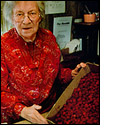 WA: Effie Ritchie, well she is such a marvelous woman. She's holding a box of raspberries there. She was just kind of helping run the resort. She had had it for years and years and then she kind of turned it over to her daughter and son-in-law. But she had these marvelous, marvelous stories. She told me once - if I may tell you this - she says, "In 56 years in the resort business I've been struck by lightening twice, walked through rainbows, been chased by a bear, attacked by a starving bobcat, a timber wolf snagged my skirt, and I've kicked porcupines out of the road. I'm a go-go kind of person." She certainly is, I say, and she's more than willing to explain and describe all episodes mentioned, but they tend to be rather long stories. Effie doesn't have many short ones.
WA: Effie Ritchie, well she is such a marvelous woman. She's holding a box of raspberries there. She was just kind of helping run the resort. She had had it for years and years and then she kind of turned it over to her daughter and son-in-law. But she had these marvelous, marvelous stories. She told me once - if I may tell you this - she says, "In 56 years in the resort business I've been struck by lightening twice, walked through rainbows, been chased by a bear, attacked by a starving bobcat, a timber wolf snagged my skirt, and I've kicked porcupines out of the road. I'm a go-go kind of person." She certainly is, I say, and she's more than willing to explain and describe all episodes mentioned, but they tend to be rather long stories. Effie doesn't have many short ones.
LB: She's an elderly lady now, in this picture.
WA: Yeah, that was in '91. I haven't been in touch with her so I don't know if she's still with us. I hope she is.
LB: Some of these pictures you got people to pose for you.
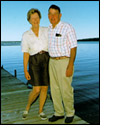 WA: Occasionally. Now she is not really posing. She happened to be there, and I'd hang around the counter there, and at one point, I'd say, "Effie, show me those raspberries" and I'd make a picture like that. But there are very few; there's one or two, for instance Ann and Ed Davis that own Boberg's Motel and Cottages on Gull Lake. They're out there on the dock. I asked them to stand there. But most of them - the work I tend to do - is work that is the result of my reacting as opposed to directing.
WA: Occasionally. Now she is not really posing. She happened to be there, and I'd hang around the counter there, and at one point, I'd say, "Effie, show me those raspberries" and I'd make a picture like that. But there are very few; there's one or two, for instance Ann and Ed Davis that own Boberg's Motel and Cottages on Gull Lake. They're out there on the dock. I asked them to stand there. But most of them - the work I tend to do - is work that is the result of my reacting as opposed to directing.
LB: Yeah, most of the pictures in here, you're capturing "moments."
WA: They're moments. But as I say in my acknowledgment, I thank everyone that's in those photographs because the best pictures very often are kind of given, not taken.
LB: There's a great picture in here with some fisherman; brought back some really big -
WA: Oh, the muskie?
LB:- Fish. Yes. And the little boys are crouching down looking at them intently. You can just -
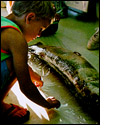 WA: That's a picture taken at Reed's Sporting Goods up in Walker. This was a huge muskie brought in, and it's all wrapped in plastic, and it's about to be weighed, and this one little boy, he's kind of crouched over it, as if he's examining some prehistoric monster that's just been discovered and brought in.
WA: That's a picture taken at Reed's Sporting Goods up in Walker. This was a huge muskie brought in, and it's all wrapped in plastic, and it's about to be weighed, and this one little boy, he's kind of crouched over it, as if he's examining some prehistoric monster that's just been discovered and brought in.
LB: And no doubt, that's exciting to them.
WA: Oh, I hope so. I'm sure it is. Yeah. It would be to me. It is to me now (laughs) to see a fish like that!
LB: What are your favorite pictures in the book?
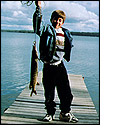 WA: The picture of my son Anthony with the northern. I just love that picture because that's really what the book is about. It's about how it feels to be that age, and that lake is not 400 acres, it's a sea, it's an ocean, it's huge.
WA: The picture of my son Anthony with the northern. I just love that picture because that's really what the book is about. It's about how it feels to be that age, and that lake is not 400 acres, it's a sea, it's an ocean, it's huge.
LB: And he really looks pretty impressed with himself. He can't even contain it!
WA: Oh, Anthony's pretty impressed with himself normally anyway!
LB: Do you notice a difference, though, in the age of your subjects? Some of the other guys, I think you've got it - Anthony's picture is juxtaposed to an older guy who has a big -
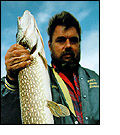 WA: A big burly fishing guide took me out. We were on Big Winni and I told him, "I wanna fish for northerns." And he kinda looked at me like something was wrong with me. Why am I not fishing for walleye? See, I hate to admit it on the air like this, but I'm not a walleye fisherman. I like to fish for northerns because they fight like the devil. They fight hard. I love to catch big sunfish because they fight hard. And we caught that one nice northern, but he's holding it up in the air, and it is considerably larger than the one my son caught.
WA: A big burly fishing guide took me out. We were on Big Winni and I told him, "I wanna fish for northerns." And he kinda looked at me like something was wrong with me. Why am I not fishing for walleye? See, I hate to admit it on the air like this, but I'm not a walleye fisherman. I like to fish for northerns because they fight like the devil. They fight hard. I love to catch big sunfish because they fight hard. And we caught that one nice northern, but he's holding it up in the air, and it is considerably larger than the one my son caught.
LB: And yet he doesn't look nearly as happy.
WA: Well, no. The guide isn't nearly as happy. He almost looks like he has a little disdain for that northern. I don't. I think it's a handsome fish. But he'd rather be holding up a large walleye.
LB: Hmmm. Okay. So that's the story behind that -
WA: He's an excellent guide, and he'll fish for anything you want.
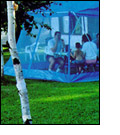 LB: You also have, I think, a very comical picture here in, at the Birch Villa Resort. It looks really [like] a typical summer scene, the grass is really green, everyone's out picnicking.
LB: You also have, I think, a very comical picture here in, at the Birch Villa Resort. It looks really [like] a typical summer scene, the grass is really green, everyone's out picnicking.
WA: But you notice they're having dinner in their tents.
LB: They are! In their mesh?
WA: In their mosquito-proof tents. And I don't recall the mosquitoes being that bad! I don't know if I'm getting older and I just don't have the flavor they prefer, but mosquitoes don't seem to get to me. I haven't had a mosquito problem in Minnesota for a long time. And, of course, in Virginia, we don't have them. They're not allowed in Virginia where I live.
LB: Now that you've done this book do you find yourself looking at it, thinking that it's time to move back?
WA: I've had thoughts, or mused over the recent years about coming back to Minnesota. The Twin Cities are such great towns, the state is such a great place. I brag up the Twin Cities all the time, and most people that I know that come back after being here for the first time, always, always reaffirm my feelings about it. But the winters are long!
